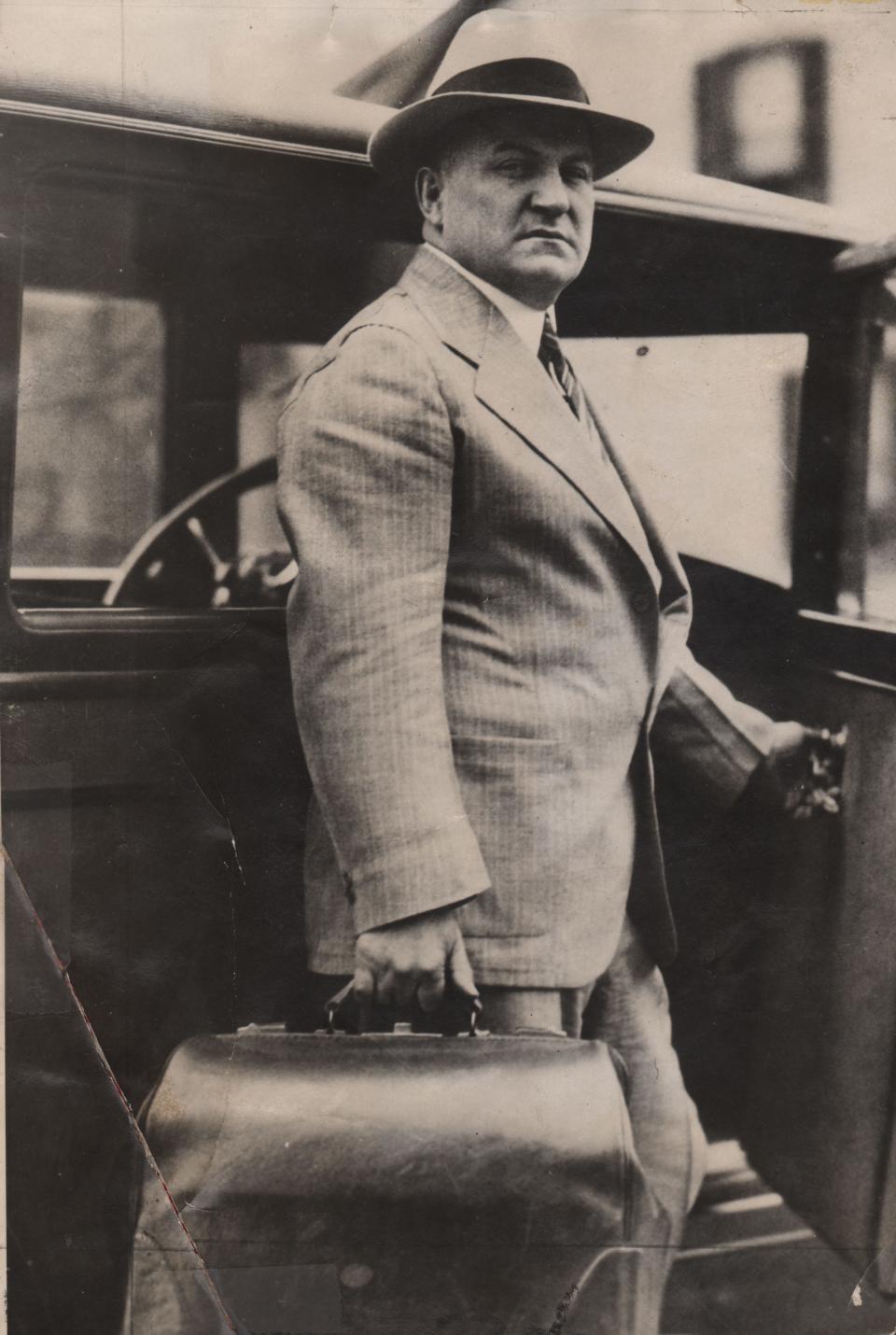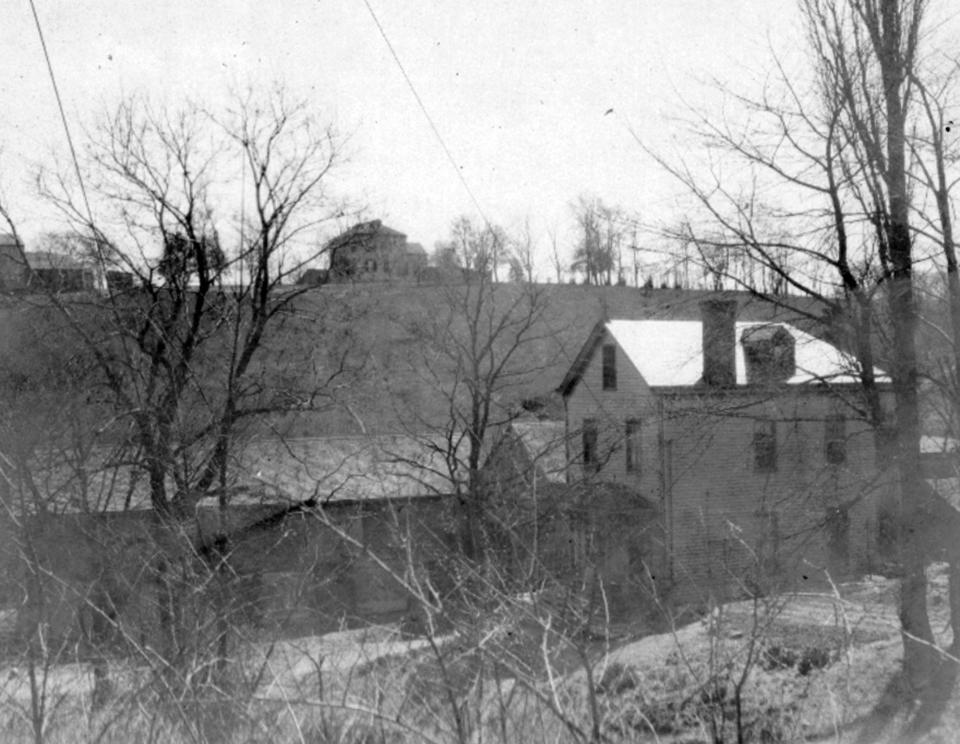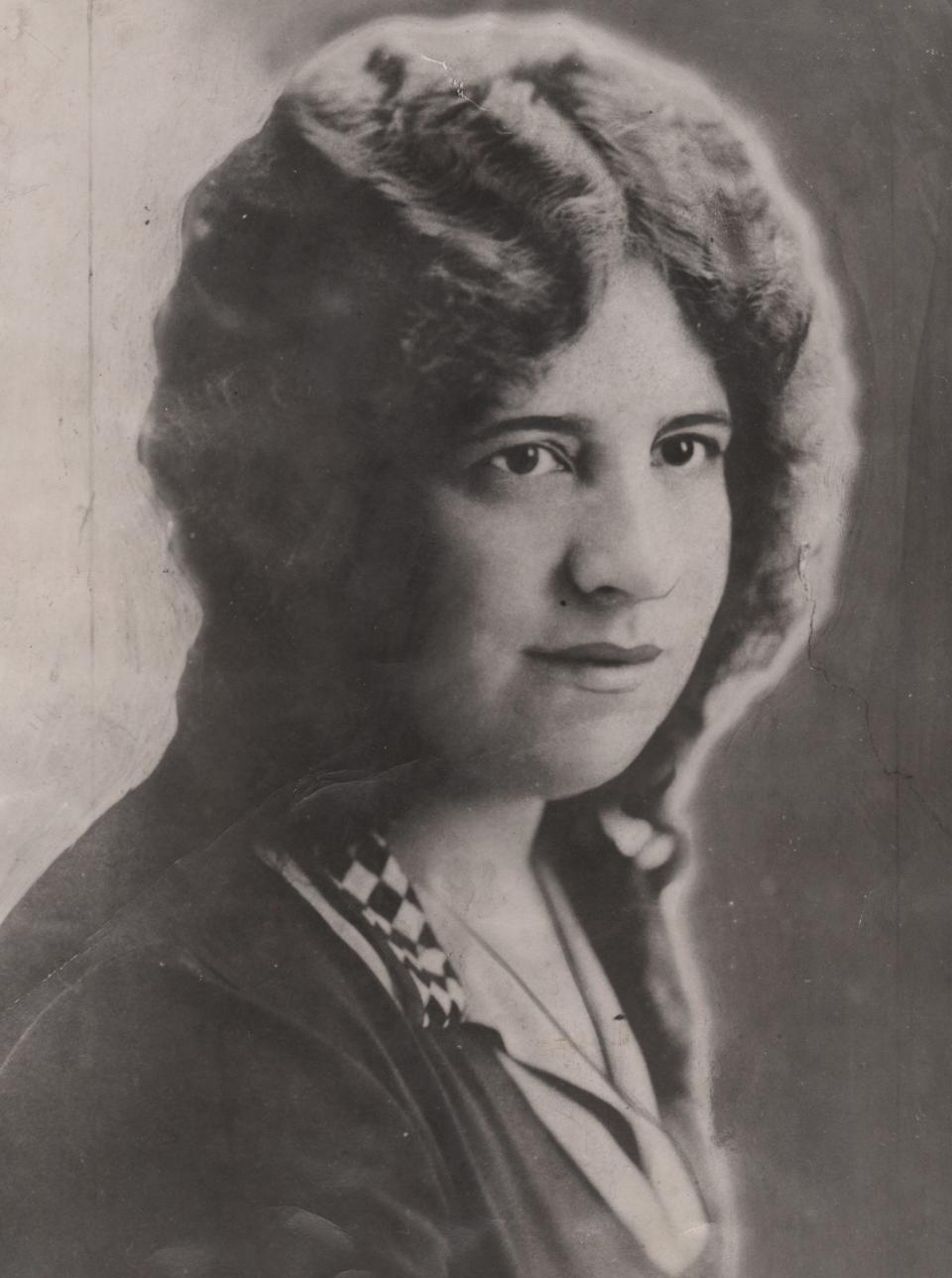Queen City Crime: George Remus, the wife-killing 'King of Bootleggers'
- Oops!Something went wrong.Please try again later.
The Cincinnati region has been connected to monumental crimes and criminals in years past. In this column, we’ll look at cases with local ties that were huge news when they happened.
When people think of the bootlegging days of yore, thoughts usually drift to Chicago and mobster Al Capone, whose reign over the Prohibition era was as infamous as it was violent. But the man who earned the nickname King of the Bootleggers – and controlled an estimated one-third of illicit liquor sales at his peak – was actually based right here in Cincinnati.
Eventually, at least. George Remus’ story began overseas when he was born in Berlin sometime between 1874 and 1878. (Official documents vary, and Remus himself was never the most reliable narrator about his life.) The passenger list documenting his move to America with his parents in 1882 listed his age as 4 at the time, but other documents might have fudged his date of birth a few years to allow him to work earlier. After a bit of bouncing around, the family settled in Chicago.

Remus' father, Frank, was a "mean and abusive alcoholic," according to author Karen Abbott, who gave a talk about Remus after writing the book "The Ghosts of Eden Park" about his life. That forever shaped Remus' view on liquor, of which he never partook, despite later being one of the nation's leading rum runners.
But first, he was a pharmacist. After Remus’ father developed rheumatism, an autoimmune disease, that kept him from working, George Remus quit school and began working at his uncle’s pharmacy in Chicago to support the family. After rising through the ranks to become a pharmacist, Remus then shifted gears to become one of Chicago’s most flamboyant defense lawyers, earning him diverse nicknames. His admirers called him the “Napoleon of the Chicago bar,” while critics referred to him as “the weeping and crying Remus.”
It was through Remus’ defense lawyering that he got the idea to enter the bootlegging world. After the 18th Amendment was ratified in 1919, Remus declared it absurd. The law meant to curtail alcohol manufacturing featured huge and easily exploited loopholes. For example, people could still make alcohol for supposedly medicinal purposes (which indeed was a thing: booze was prescribed to treat all kinds of ailments, including pneumonia, high blood pressure and dozens of others), and folks could buy and sell alcohol that had been manufactured before the ban was enacted.
Remus represented a number of bootleggers and, as he later told it, noticed that those clients always paid in cash. Between the hypocrisy and the profit margins, Remus decided selling liquor was a lucrative business opportunity. Why he didn’t operate out of Chicago was simple: It was all about location.
Ties to Cincinnati
Remus did some research and realized about 80 percent of the country’s legally made, quality-assured, pre-Prohibition whiskey was stored within a 300-mile radius of Cincinnati, which Remus figured made it an ideal location to ship from nationwide. With that in mind, Remus and his wife, Imogene, moved to a lavish home in Price Hill, on which they spent hundreds of thousands of dollars renovating and expanding.
Remus created a circular business model that ensured he made enormous profits off his bootlegging enterprise: He launched a drug company that would serve as a wholesaler to drug stores. Remus also created a trucking firm to transport the booze, which delivered it to a distribution center on an isolated farm that Remus owned.
That was one way Remus ensured that he kept as much money in-house as possible. Here was another: Remus would hire goons to hold up some of the distribution trucks and steal booze to sell illegally, while also cooking the books to make it appear nothing was amiss to government agencies tracking liquor sales.

“The Circle,” as Remus called his operation, was wildly successful.
Customers "came from all over the country," Remus said in 1926, according to the Louisville Courier-Journal. "They included the fashionable clubman who bought for his personal use, the large hotel, the fashionable club, the whiskey jobber, the petty bootlegger. They were as anxious to buy as I was to sell."
Sales sometimes hit $80,000 a day, or nearly $1.5 million in today’s money.
The takedown
Though Prohibition wasn’t popular, it was still the law of the land, and enforcing that law fell to U.S. Assistant Attorney General Mabel Walker Willebrandt, who was the highest-ranking woman in America. While Willebrandt had enjoyed an occasional drink pre-Prohibition, she took her job enforcing it seriously.
A disapproving Cincinnatian wrote to Willebrandt complaining about Remus’ bootlegging operation, prompting Willebrandt to investigate. She sent a Department of Justice agent named Frank Dodge to go undercover in Cincinnati and learn what Remus was up to. Unfortunately for Willebrandt, Dodge was dirty, and while he dug up dirt on Remus as requested, he did so while seducing Remus’ wife, Imogene, who aimed to help Dodge take over her husband’s empire.
Before that could happen, Remus was busted by another player. In 1923, an incorruptible Prohibition enforcer in Lawrenceburg, Indiana, named Burt Morgan seized some Remus-owned vehicles with bottles of booze wrapped inside of Cincinnati newspapers. The trail led to Remus’ Ohio headquarters, which Morgan’s agents raided, uncovering a small arsenal of weapons, some $40,000 worth of alcohol and Remus’ business records to boot.

Remus spent more than two years in prison – though, thanks to bribes slipped to wardens and guards, the time was far more comfortable than it could have been. Remus had a private cook, was allowed to redecorate his cell to his liking and often hosted dinner parties. Imogene came to visit regularly, but rumors spread that she and Dodge were having an affair. When it became clear the rumors were true, Remus would pace his cell, tear at his hair and swing from mania to depression. Sometimes he’d go blank for minutes at a time, then suddenly begin ranting and raving in unhinged ways.
Another crime
By the time he finished his prison sentence, Imogene had not only filed for divorce, but her affair with Dodge had reached FBI head J. Edgar Hoover’s attention. On Oct. 6, 1927, as Remus was driven toward a downtown Cincinnati courthouse for his final divorce hearing, he spotted Imogene on the street. He jumped from his car and chased her to Eden Park. As his wife begged for her life, Remus buried a pistol in her stomach and pulled the trigger. She died en route to the hospital.
Remus, the former Chicago lawyer, opted to defend himself. He faced as his prosecutor Charles P. Taft II, the son of former president William Howard Taft, who at the time of the trial was chief justice of the U.S. Supreme Court.
Hundreds of people clambered daily to get seats inside of the courtroom as Remus insisted he’d been temporarily insane when he shot his estranged wife. If spectators were hoping for a show, they got one. A New York Times story headlined "REMUS NEAR BLOWS WITH PROSECUTORS" described Remus as shaking his fist under Taft’s nose while threatening to beat him in the corridor.
The aftermath
After four weeks of trial, the jury took 19 minutes to find Remus not guilty by reason of insanity. He spent two months in a state hospital before being freed.
Several years later, Remus sold his once-grand estate in Price Hill. The home’s new owner had the house razed in October 1934, while the pool was dismantled six years later. Remus died Jan. 20, 1952.
Enquirer journalist Amber Hunt is also host of the podcast "Crimes of the Centuries" on the Obsessed Network.
This article originally appeared on Cincinnati Enquirer: Cincinnati king of bootlegging George Remus' crimes revisited

